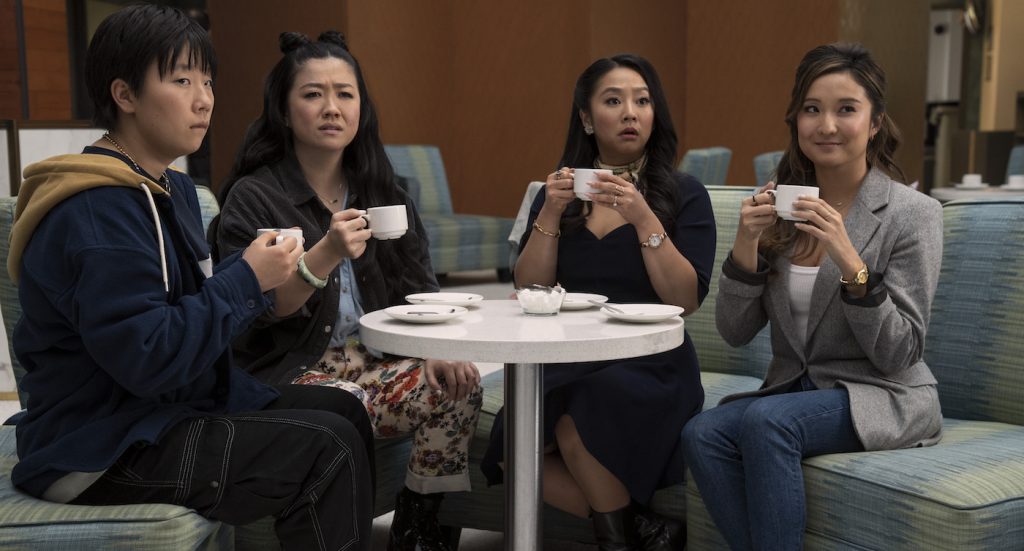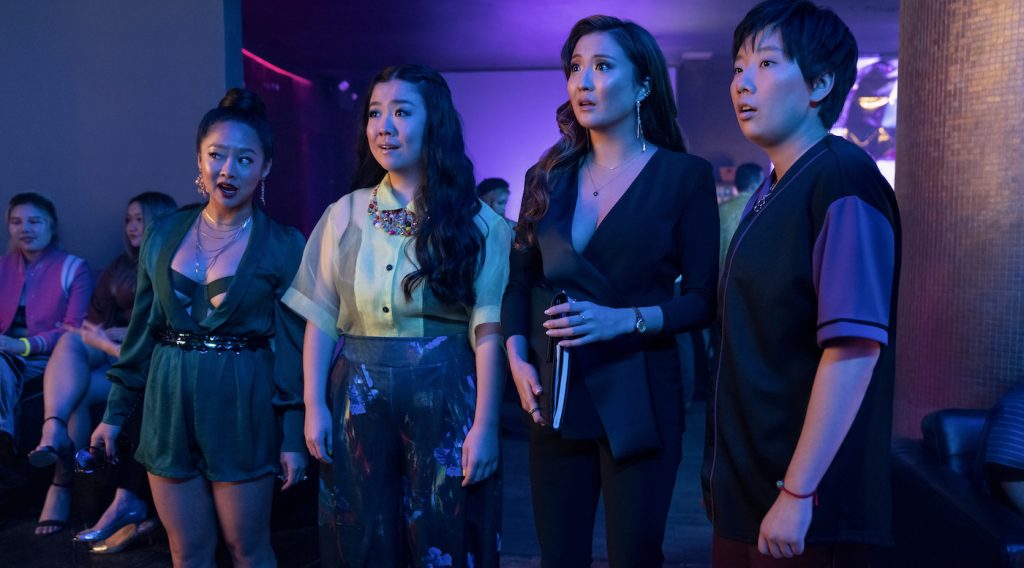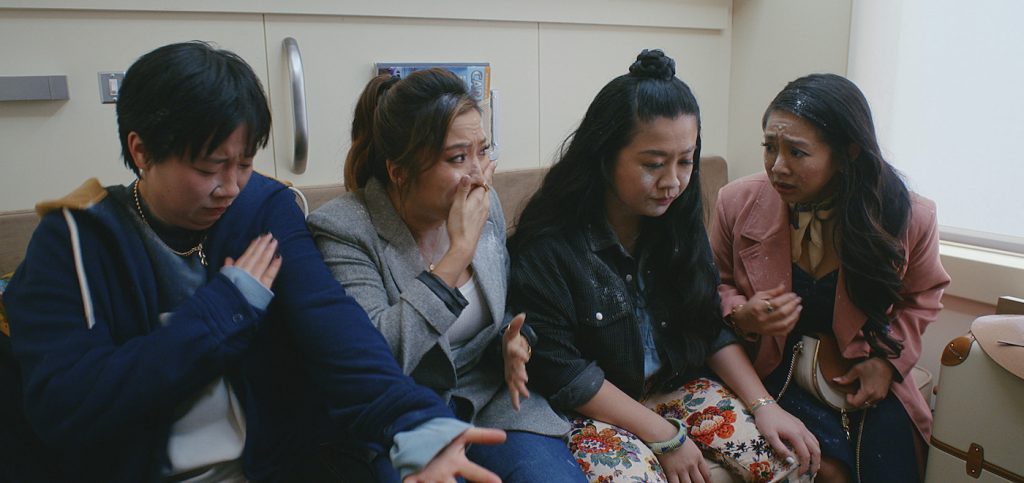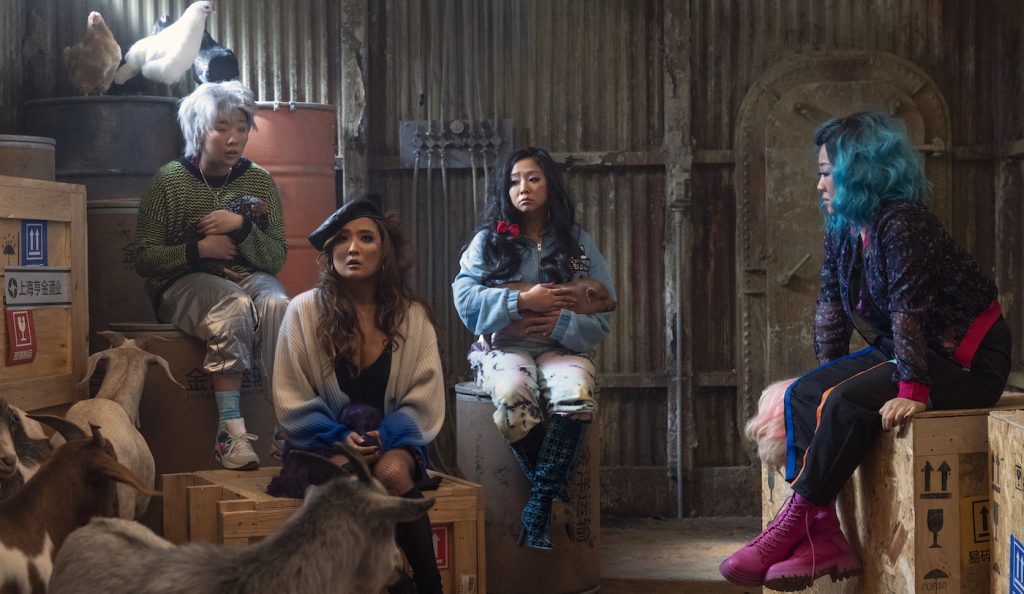“Joy Ride” Screenwriters Cherry Chevapravatdumrong & Teresa Hsiao Embrace the Raunch
Adele Lim’s feature directorial debut Joy Ride cruised into theaters this past weekend, boasting critical raves. The laughs come early and often in Lim’s ensemble film, thanks in large part to screenwriters and producers Cherry Chevapravatdumrong and Teresa Hsiao. The talented duo began writing the script for Joy Ride on spec, and that sense of freedom and play is on full display.
The screenwriters both met in the writer’s room in Seth MacFarlane’s joke-a-second animated raunch-fest Family Guy and in Joy Ride, they take full control, telling the story of four friends on a trip gone wildly wrong but also imperfectly, beautifully right. When Audrey (Ashley Park) goes to China for a work trip, she’s joined by her college roommate, Kat (Stephanie Hsu), and her childhood best friend, Lolo (Sherry Cola), whose delightful cousin Deadeye (Sabrina Wu), tags along. It’s a story about having a good time while learning to deal with the bad times, and it also explores questions about identity and friendship.
Recently, Chevapravatdumrong and Hsiao – who share an undeniable rapport on and off the page – recently took us behind the scenes of crafting the feel-good comedy of the summer.
What was the initial vision for Joy Ride?
Cherry Chevapravatdumrong: Well, very R-rated, very raunchy. We always knew that that’s what we wanted. The original title of the movie was Joy F**k Club for a reason. At no point during the writing did we ever think it was a cute PG-13 romp. Philosophy-wise, oftentimes on the set, on the day, there are things that seem very funny. But one of the reasons that we made sure to shoot alts for a lot of the jokes is because later, when you’re actually putting it together, and you’re actually having an audience watch it for the first time, sometimes something that everyone thought was very funny on the set on that day may not resonate as well with an audience of 200 people. Just making sure you have options. Just make sure you do as much as you can so that later on in the game, you have puzzle pieces to play with.
What about you, Teresa?
Teresa Hsiao: Anytime I watch any comedy, I always want it to be joke-heavy, but at the same time, I want to care about the characters too. In the best movies that I’ve seen, you feel deeply for the characters. It’s not just someone out there spouting a joke a minute; it’s funnier because someone said it that you care about. I think going into this movie, we wanted to create four full-fledged characters who had their own stories, had their own arcs that, hopefully, by the end of the movie, you feel deeply for each and every one of them.

Usually, in ensembles, somebody is left on the sidelines, but that’s not the case with Joy Ride. How’d you manage to give every character their due?
Chevapravatdumrong: We had charts. We literally had charts.
Hsiao: We’re insane because we actually had a grid. We had all the names at the top, and then we had their names down on the vertical axis, too. It’s a chart like, how does Audrey affect Lolo’s life? How does Lolo affect Audrey’s life? How does Audrey affect Deadeye? So much that isn’t in the movie, but it was about knowing each one of them. What are their backgrounds? How do they move forward after the movie?
Chevapravatdumrong: We nerded out big time. Data helps character. Is that a sound bite? That Excel spreadsheets help character?
When writing friendships, for both of you, what are the little things that make them believable?
Hsiao: I think they came from such a natural place. I grew up in an incredibly homogenous town, and I had one friend growing up who was also Asian and her name was Lisa. People got us mixed up all the time because we had rhyming names, even though we didn’t look anything alike, and we were immediately best friends. She ended up moving away when I was in middle school, and it was very sad for me. My parents were always like, “Now we’re the only ones.” I always remember thinking back to her and wondering if we were friends because we actually had a lot in common or if we were just friends because we were both two Asian girls in a really white town. I think so much of the characters’ personalities are based on real-life friends that we have. These characters kind of come from our own lives, obviously fictionalized versions, so it made it a little easier to write.
You were both on set as well. As both writers and producers, how’d the script evolve from a creative and practical standpoint?
Chevapravatdumrong: There were some checkpoints along the way that we always knew were gonna happen in this story. We always knew that Audrey was going to have this adoption thing, this identity thing. We always knew that they were going to wind up in Korea and have a K-pop sequence. We always knew they were going to run into a basketball player and ACB basketball team. Within all of those set pieces, things definitely changed along the way. The train sequence was a car chase at some point but then went back to a train sequence. Even the club sequence was bigger with multi-levels and karaoke. There were a lot of changes. All of us and Point Gray, our producers who are very experienced in making movie comedies like this, we’re always pushing ourselves for, what’s funnier, what could play bigger, and what could be most exciting to watch in the theater.

You also had to make cuts since the film originally was even raunchier. What did you have to lose?
Hsiao: The first iteration of it was rated NC 17. There was a deleted scene that is no longer in the movie that involved another [vagina] tattoo. It was gonna be a post-credit scene, basically [laughs]. I’ll let you play with your imagination in terms of who [else] got a tattoo. Basically, Kat is not the only one in the couple who got a tattoo. But that scene, along with other pieces of the montage, made it apparently a little too scandalous.

So, Joy Ride reminds me of the R-rated movies you’d sneak into as a teenager.
Hsiao: I hope people sneak into the movie but also pay for it [laughs].
At one point, there’s a beautiful message expressed to Deadeye about them being original and to embrace what makes them unique. Knowing that this is the kind of R-rated movie teens will probably watch, is there anything you wanted the movie to say or speak to for younger audiences?
Hsiao: Yes. I definitely think we want people, especially people who are not feeling themselves as much, to see it. Not only representation in terms of seeing yourself on screen, but in terms of having a non-binary character and having that moment where they really feel like they’re part of the group, but not having it be like, “Hey, we’re teaching you this moment.” It’s not a coming-out moment in any sort of way. Because again, in this movie, Deadeye’s story is something totally different. I do think, for a lot of people, hopefully, this is the first time that they are able to see themselves on screen. They’re able to see themselves, in a way, that you don’t have to be the perfect person, you know? You can be messy, you can be raunchy, and you can be crazy, and it’s all okay.

Featured image: Stephanie Hsu as Kat, Sabrina Wu as Deadeye, Ashley Park as Audrey, and Sherry Cola as Lolo in Joy Ride. Photo Credit: Ed Araquel



